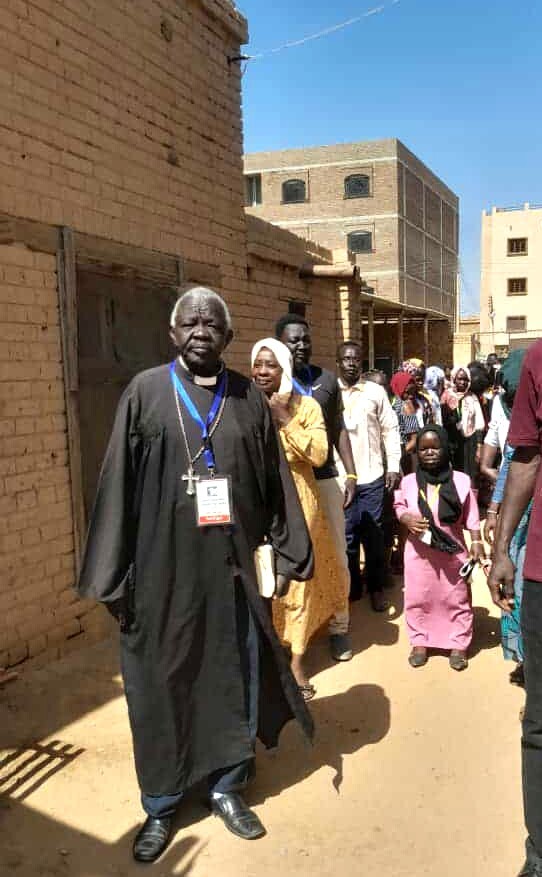Police arrested a pastor in Nile River state on Tuesday night, October 28, in an apparent attempt by a Sudanese Muslim businessman to seize church property and jailed him overnight, officials said.
According to church members, two police officers from the State Criminal Investigation Department arrived at the home of Sudanese Evangelical Presbyterian Church (SPEC) Pastor Daud Hudur Katju in Atbara around 6 p.m. and filed an arrest warrant.
When the members said they needed to speak to the church’s lawyer first, the officers were initially understanding, but then two other officers, who had been hiding behind the church building, appeared and forced Katsch into a car, church members said.
They took him to Atbara police station where he was jailed. During an intensive interrogation on Wednesday morning (October 29), police handed down a request to the Muslim businessman to vacate the church premises for 30 days, members said.
“They (police officers) told us, ‘The law comes before your religion,'” a church member told Morning Star News by phone from the police station.
Church officials said police asked the pastor to sign a document stating that he would no longer oppose anyone who tried to seize church property, but the pastor refused.
Pastor Katju, who has led the church for 30 years, was initially denied bail, but police released him after church lawyers intervened. Police released the church leader without bail on Wednesday, Oct. 29, shortly before 1 p.m.
“The pastor has already been released,” a church member told Morning Star News.
The officers were reportedly attempting to interrogate church councilors appointed by Muslim businessmen.
The fight over church assets began several years ago, when governments favoring Muslim business interests seized assets owned by SPEC and other churches in Khartoum and other Sudanese states.
Years of attempts by Islamists to take over Sudan’s Christian schools continued in September, officials said, even as war-displaced people took shelter in the facilities. On September 3, three Muslims, including Islamic business interests, forced their way into the war-torn Sudanese Evangelical School in Omdurman, across the Nile from Khartoum, and threatened hundreds of mostly Christian people displaced by the civil war to “leave the premises,” a local church leader said.
According to church leaders, the intruders entered the principal’s office at a school affiliated with SPEC and broke down the office door. He said the intruders threatened to take over the facility by force without specifying a deadline.
The complex suffered repeated attacks under the regime of ousted President Omar al-Bashir, mostly by supporters of Islamic businessmen who tried to seize the land by force, accompanied by police.
According to the Joshua Project, Sudan is 93% Muslim, with 4.3% of the population practicing traditional ethnic religions and 2.3% Christians.
The situation in Sudan has worsened since April 2023, when a civil war broke out between the militia Rapid Support Forces (RSF) and the Sudanese Armed Forces (SAF). According to Open Doors’ 2025 World Watch List (WWL) report, increasing numbers of Christians have been killed, sexually assaulted and their homes and businesses attacked in Sudan.
“Christians of all backgrounds are trapped in the chaos and unable to escape. Churches are shelled, looted and occupied by the warring parties,” the report said.
RSF and SAF are both Islamist groups that attack displaced Christians for supporting the other country’s fighters.
The conflict between RSF and SAF, which shared military rule in Sudan after the October 2021 coup, has terrorized civilians in Khartoum and elsewhere, killing tens of thousands of people and displacing more than 11.9 million people inside and outside Sudan’s borders, according to the United Nations Commissioner for Human Rights (UNCHR).
SAF General Abdel Fattah al-Burhan and then-vice president and RSF leader Mohamed Hamdan Dagalo were in power when civilian parties agreed in March 2023 on a framework to re-establish a democratic transition the following month, but disagreements over the structure of the military stalled final approval.
Mr. Burhan aimed to bring the RSF, a militia with roots in the Janjaweed militia that helped quell former strongman Bashir’s rebels, under regular military control within two years, while Mr. Dagoro intended to accept integration within 10 years.
Although both military leaders have Islamist backgrounds, they seek to present themselves to the international community as champions of religious freedom and democracy.
Open Doors’ 2025 World Watch List (WWL) ranks Sudan fifth among the 50 most difficult countries to become a Christian, down from eighth the previous year. Sudan fell out of the top 10 of the WWL list for the first time in six years when it was ranked 13th for the first time in 2021.
After two years of progress in religious freedom in Sudan since the fall of Bashir’s Islamic dictatorship in 2019, the military coup on October 25, 2021 brought back the specter of state-sponsored persecution. After Bashir was ousted from power after 30 years in April 2019, the Interim Civil-Military Government succeeded in revoking some Sharia (Islamic law) provisions. The law prohibited labeling any religious group as “infidel” and effectively repealed the apostasy law, which made leaving Islam punishable by death.
The October 25, 2021 coup left Christians in Sudan concerned that the most repressive and harsh aspects of Islamic law would be reinstated.
In 2019, the U.S. State Department removed Sudan from its list of countries of particular concern (CPC) that commit or tolerate “systematic, persistent, and egregious violations of religious freedom,” and elevated it to its watch list. Sudan was designated as a CPC from 1999 to 2018.
In December 2020, the State Department removed Sudan from its special watch list.
